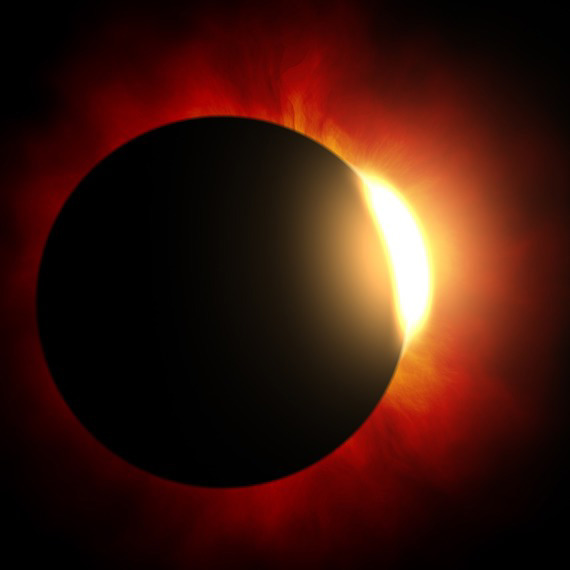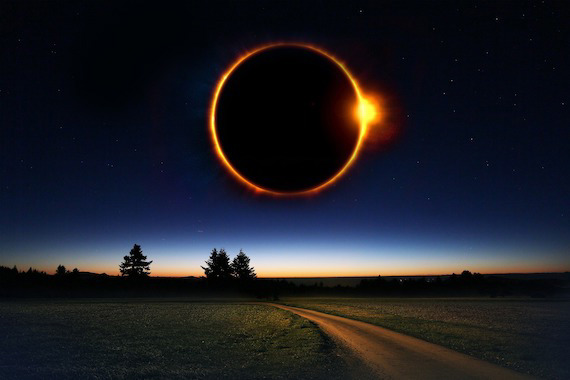Mystical Eclipses That Changed the Tide of War

Throughout history the moon has held a special allure for humankind. Legends and myths have sprung up around it across the globe, from all corners of the earth and from all manner of farflung, disparate cultures. One aspect of the moon that has espacially enthralled us over the centuries is that of eclipses, and here is where things get fairly weird. Eclipses have been known throughout the ages for causing fear, mass panics, and even changing the course of history, and here we will look at cases of eclipses that had an influence on wars with repercussions that have reverberated through time.
Our earliest and perhaps best known case here dates back to the year 585 BC during the Battle of Halys, which was fought in Anatolia (present-day Turkey) between the Medes and the Lydians. Apparently the battle was long, bloody, and arduous, the two sides going at each other without a clear winner in sight. At some point during this indecisive battle it was reported that the sun was blotted out by a solar eclipse, bringing total darkness down upon the battlefield that turned day into night, causing a great uproar on both sides of the fight. Men screamed or cried, and there was a general sense of disorientation and panic as the fighting ceased and the troops merely looked up in wonderment and terror.
At the time, eclipses were mysterious things that no one really understood and which inspired awe and dread. It was not known that these eclipses were caused by the Moon coming between the Earth and the Sun, and so they were seen as miraculous celestial events from powers beyond our understanding. It was for this reason that the battle was stopped dead in its tracks, and making it even more mysterious is that this particular eclipse was claimed by the ancient Greek historian Herodotus to have been predicted by the Greek philosopher Thales of Miletus. Herodotus would write of it:
Another combat took place in the sixth year, in the course of which, just as the battle was growing warm, day was on a sudden changed into night. This event had been foretold by Thales, the Milesian, who forewarned the Ionians of it, fixing for it the very year in which it actually took place. The Medes and Lydians, when they observed the change, ceased fighting, and were alike anxious to have terms of peace agreed on.

If Herodotus’ account is accurate, this eclipse is the earliest recorded as being known in advance of its occurrence. However, there has been some debate as to whether this prediction was really accurate or whether it ever even happened at all. It has been pointed out that the known astronomical knowledge available of that time was not sufficient for Thales to predict the eclipse, and furthermore there is no mention of what his methods were or how he would have gone about such a thing. It is known that there was a solar eclipse on that date and that it disrupted the battle, but whether Thales really predicted it in advance will never be known. Whatever the case may be, it is all a curious account of a celestial event bringing two armies to their knees.
Another case supposedly happened in 413 B.C., during the height of the Peloponnesian War, a decades-long struggle between Athens and Sparta, in Greece. At the end of August of that year, the army of Athens, led by aristocratic general Nicias, had seen better days. They had been campaigning against the Sicilian city-state of Syracuse in a bid to keep them from sending aid to the city-state of Sparta, but had failed miserably, losing hundreds of men and at least seven ships, and now their defeated army was battered and bruised, camped out next to a dim, mosquito infested swamp and with many of the men too deathly sick, weak, or injured to fight anymore. This rather dire situation was made even worse when Spartan soldiers arrived to reinforce the Syracusians, and things were looking bleak, indeed. Nicias decided to call it quits and get out of there, a temporary retreat in order to regroup and gather reinforcements. The plan was to sneak out in the remaining ships under the cover of darkness, and he would have probably gotten away with it too if it were not for some celestial intervention.
On that evening as Nicias’ forces were preparing for their departure, there was an eclipse that turned the moon a deep, eerie red. This ominous sight apparently sent the Athenians into a panic, especially Nicias, who by all accounts was absolutely terrified that it was a bad portent of imminent death. After some conferring with his priests and advisors, it was determined that the eclipse was bad news for them, a sign from beyond, and the Greek historian Plutarch would say of it:
The Moon itself to be darkened, how that could come about and how, on the sudden, a broad full Moon should lose her light and show such various colors, was not easy to be comprehended. They concluded it to be ominous and a divine intimation of some heavy calamities.

As such, it was decided that with such a bad omen hanging in the sky above them it would be foolish to try to flee at that time, and that they should postpone their escape. Unfortunately for them, the Spartans and Syracusians took full advantage of this delay and panic, swooping in to attack and launching a massive naval battle that would end with a severe beating that left the Athenians practically decimated. A joint force of Athenian and Etruscan reinforcements helped them avoid to being completely slaughtered, but surrounded by a vastly superior enemy force, their ships destroyed, and the harbor blockaded they were in pretty dire straits. The Athenian force would be throttled during an effort to fight their way out over land, and they only got a few miles to the Anapo River, where they were massacred and captured by a waiting Spartan force. Nicias would be executed not long after this, and it was all because of that blood red eclipse, with the defeat in Sicily marking the beginning of the end of Athenian dominance.
A similar account comes from the year 331 B.C. At the time, Alexander III of Macedon, better known as Alexander the Great was preparing for what would become the Battle Of Gaugamela, fought against his enemy Emperor Darius III of Persia. Alexander the Great was in quite the predicament at the time, his forces greatly outnumbered by the well-equipped and well-armed Persians and the outcome of the battle looking grim. Indeed, there were those who thought the whole operation was folly, and that the Macedonians were doomed if they proceeded. As they trudged along towards the battlefield of Arbela, in Assyria near the village of Gaugamela on the banks of the river Bumodus and as they came into view of the enemy army, there occurred a total eclipse of the Moon, which glowed a sinister deep blood red, and which astrologers assured meant that the blood of the enemy would be spilled on that night.
The eclipse apparently noticeably caused a lot of fear and a tumult in the Assyrian camp, where the superstitious men were taking the blood red eclipse as a dire omen of destruction, their numbers seemingly becoming confused and disorganized. Alexander the Great’s advisors and astrologers tried to persuade their leader to strike that night while the enemy was disoriented by the eclipse and the Macedonian moral was high, but Alexander refused, choosing instead to let the enemy camp rest, famously saying “I will not steal a victory.” Considering his outnumbered army, it was perhaps foolish not to take advantage of the moment at the time, but Alexander would nevertheless win the battle in the end, partly due to his superior tactics and the clever usage of light infantry forces, but also due to the profound effect that the eclipse had had both on the morale of his men and the fear it had struck in the enemy. The Assyrian defeat at the Battle Of Gaugamela would lead to the fall of the Achaemenid Empire and of Darius III, and historians believe that it is at least partially thanks to that blood moon eclipse.

More recently there is a case from the American Revolutionary War, when eclipses still scared people and the first president of the United States himself, George Washington, found that information about eclipses could even be valuable to the war effort. On January 8, 1777, just days after his stunning victories over the British at Trenton and Princeton, General Washington in a letter thanked the Pennsylvania Council of Safety for a message to him that had read:
According to Astronomical Calculations, on Thursday next between the hours of 9 and 11 in the forenoon, a great Eclipse of the Sun will be visible here, perhaps it may not be amiss on this occasion to guard against a superstitious fear in the Army which might take place should the Men be unexpectedly surprised with this appearance.
Indeed, an eclipse did occur and stir up much superstition and fear in the men, with it being judged that it “might affect the minds of the Soldiery, and be attended with some bad consequences.” Interestingly, more than a year later, on June 24, 1778, a total solar eclipse was recorded as being visible by combatants from the Carolinas to New England, and in this case it was taken as a good omen. Perhaps they were right, because Washington’s troops were left in command of the field of battle. It only adds to the intrigue and mystery the moon has long had for us, especially in an age when eclipses were seen as something more than just a normal planetary phenomenon. It does not seem to matter whether these events really had any magical effect, only that the peoiple involved believed that it did, and it all represents some very strange historical oddities, indeed.




